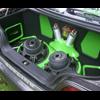Nitrous Purging
Announcements
-
Latest Posts
-
The opposite experiment is equally viable. 10L of petrol in the tank + 2L of metho.
-
I think you'll find that all fuel in some countries has 10% ethanol in it.
-
I'm with both M & D here. There's little harm, unless you're prone to getting annoyed by over-enthusiastic displays of wild optimism and/or stupidity**. And there is potential benefit from basking in the warm glow of schadenfreude, if you get something from that. **The bookface generation seem to think that if they can see something on the internet, then it must have been posted just before, because there is clearly absolutely no history when everything is served up on some sort of dash, fresh for your algorithm fed delectation.
-
It's sure fancy, you better go faster now (although I notice it is still bluetooth to the braking system for now, maybe plumb it in?) Will be interesting to see what you think of it and how much you use the adjustment
-
I've got to be honest, I don't see the harm in people asking on old posts.....I've got a lot of stuff lying around that I never update, and you never know who will remember they have something around
-



Recommended Posts
Create an account or sign in to comment
You need to be a member in order to leave a comment
Create an account
Sign up for a new account in our community. It's easy!
Register a new accountSign in
Already have an account? Sign in here.
Sign In Now